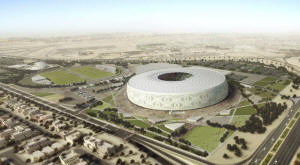|
Saudi Arabia, Egypt, Bahrain and the United
Arab Emirates imposed sanctions on fellow U.S. ally Qatar in
June and cut all transport links with the country, accusing it
of supporting terrorism - a charge Doha denies.
To get around the boycott, Qatar has flown in food from Turkey
and Iran and chartered ships via Oman to bring in construction
materials needed for World Cup projects.
The tournament is the centerpiece of a strategy to project Qatar
onto the global stage via sport.
Doha's Al Thumama stadium, designed by a Qatari architect in the
shape of a traditional knitted "gahfiya" Arabian cap, will host
40,000 fans at a World Cup quarter final match, the country's
2022 organizing body said in a statement.
"This symbolic design embodies everything that unites us as
Arabs and Muslims, and is a fitting tribute to the first FIFA
World Cup in the Middle East," said Hassan al-Thawadi, Qatar's
2022 committee chief.
The venue is one of at least eight air-conditioned stadiums
Qatar is building along with a new port and metro system as part
of a $200 billion infrastructure upgrade.
Qatar has denied reports the Arab sanctions have hurt tourism
and lowered hotel occupancy rates.
(Reporting by Tom Finn; editing by Mark Heinrich)
[© 2017 Thomson Reuters. All rights
reserved.] Copyright 2017 Reuters. All rights reserved. This material may not be published,
broadcast, rewritten or redistributed.
 |
|






